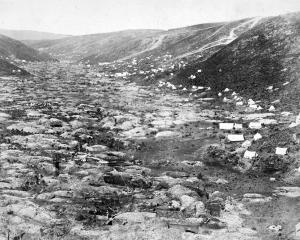Following Tropical Cyclone Pam's devastation of Vanuatu, Dunedin Red Cross worker Douglas Clark joined the relief effort. Here he describes a day in the life of a disaster response delegate.
The whine of the mosquito beat the alarm by 15 minutes: had I remembered to take my antimalarial?
I clawed myself into a semi-upright stance, my leg muscles still knotted and painful from several nocturnal cramp sessions: a reminder to up my salt intake.
A strong cup of tea slowly eased me into another day; another day of sweat, chaos, torrential rain, ever-changing plans, blinding sun, endless requests, meetings, potholed roads, shattered lives, destruction and chaos all around.
And to a sea of smiling faces, the resilient people of Vanuatu.
It had been a day like most of the others over the past week, the distribution of relief items to the ''most needy'' families.
Only the location and means of delivery varied.
Today, for me, it was to the settlement areas of Port Vila, makeshift communities of outer islanders who had come, some many years earlier, to the capital with the perception that life would offer more opportunities but which had failed them on every count.
The term ''shantytown'' came to mind, but amid the maze of rickety structures, rusted corrugated iron, meandering muddy narrow pathways, endless piles of rubbish, running, playing children, mangy dogs and eternal lines of bright colourful washing, we met the chief.
From a gnarled hand a piece of paper passed, the magic list, naming every head of household in his community.
A quick count and this number initiated a flurry of activity back out on the roadside. Our team of Vanuatu Red Cross volunteers, up until then sprawled laconically and individually over the loaded truck, then became as if a single vital energised organism.
In a long line down the road individual items were thrown to each of them at a speed and enthusiasm to match the All Blacks.
Small individual piles materialised, each one containing a shelter tool kit (spade, hoe, axe, bush knife, rope, hammer, nails, wire), a hygiene kit (towels, soap etc), a blanket, two 10-litre water containers and a 6m by 4m tarpaulin with 20m of rope.
Our team leader called out for each household head, who peeled off from the excited crowd and presented himself to sign for the relief items.
The Red Cross team here is really just the ''delivery agent''.
The items' donors want to know where and to whom their donations went and so accurate records must be kept.
The families then swooped on their pile and the items, balanced on heads and slung over shoulders, were transported amidst excited chattering back to their homes.
As noon approached we pulled over to the side of the road to have a lunch break.
There was no shade to be had: once glorious spreading trees are now devoid of all foliage or lie recumbent, shattered or snapped.
There will be no shortage of firewood now.
The team lay sprawled under the truck and I propped a twisted piece of corrugated iron against it and climbed into my little shady niche.
I forced myself to drink some tepid water and chewed without enthusiasm on a biscuit bar of some sort.
The quiet midday peace was shattered by a low-flying C130 Hercules clawing its way into a clear blue sky.
A chorus of ''Aussie, Aussie, Aussie'' emanated from the small boys in the community nearby and I stiffened momentarily, wanting to shout to them, ''No, it's a bloody Kiwi one''.
I thought back to RNZAF Whenuapai when a colleague and I climbed into one, strapped ourselves into a webbing seat and with about 15 tonnes of relief aid from New Zealand endured a very noisy five-hour journey up to Port Vila.
It seemed months ago but it was just two weeks.
At that time civil aircraft were not flying into Port Vila.
I marvelled at the airlift and complex logistics which have kept this team supplied ''at the front line''.
The pre-positioned stocks of aid in the country and in Auckland and Brisbane were soon depleted.
The RNZAF and the RAAF had done a great job ferrying them in. But these stocks, too, became exhausted and it was a big and expensive decision to charter an aircraft to supply us from our Asia Pacific warehouse in Kuala Lumpur.
It was an exciting ''boys-toys'' day the previous day when our very own Ilyushin Il-76 landed in Port Vila, perhaps the largest aircraft seen there and dwarfing the C130 Hercs parked nearby.
It took human chains three hours to unload its enormous payload, in the midst of a classical tropical downpour.
Our last truckload of the day finished, we passed through Port Vila.
The large central market, normally a bustling and energetic place upon which many Ni Vanuatu rely as their sole source of income, and where the ''townies'' go for fresh produce, was empty and desolate.
This is a major talking point.
Tropical Cyclone Pam destroyed almost all fresh fruit and vegetable sources and it will be about six months before the newly planted crops bear fruit again.
The $15 cost of an air-freighted lettuce is beyond the average Ni Vanuatu.
Incongruously, as I looked past the market across the water into a stunning sunset, I saw a familiar large white shape: a cruise ship was in town.
The passengers had been confined to the ship, but no doubt were partying and eating well.
We just made it back before curfew at 6pm. A state of emergency was still in place.
Time for the daily debrief.
Initially we had been a team of four but that had grown to 22.
Although English is the official language, the accents of my fellow delegates from the US, Canada, Argentina, the Netherlands, Britain, Belgium, France, Japan, Finland, Tonga, Fiji and, of course, us three Kiwis, all blended together, emphasising the true internationality of the Red Cross movement.
There were reports similar to mine, some of which involved boat, plane or helicopter travel to distant islands.
We also heard about anxious families that had been reconnected with missing relatives by the satellite phones we carry.
This was one of the very first functions of the fledgling Red Cross movement more than 150 years ago.
We heard of countless meetings with other agencies, the UN and of course the Government, all attempting to co-ordinate a complex, dynamic situation.
There were smaller domestic topics: security and health issues, problems with our hire vehicles, the reaction to a press release, how to celebrate a team member's birthday.
The agenda seemed endless.
Then on to the endless emails and my own day's ''sitrep'' to the team leader, who has the unenviable task of collating them all for Suva (the Pacific regional office), Kuala Lumpur (the Asia Pacific zone office) and to Geneva (headquarters of the Red Cross).
The Red Cross, in this respect, is no different from any global multinational bureaucratic organisation.
About this stage, I realised I hadn't really eaten all day, was possibly dehydrated, very dirty and dog-tired.
Canvassing like-minded and similarly conditioned fellow delegates we then set about eliminating those problems in a logical sequence.
Several hours later, just as a blissful sleep was imminent, a high-pitched whine started up by my left ear.
Damn, I knew I should have swatted the bugger this morning.
• Douglas Clark is a Field Assessment and Co-ordination Team (FACT) worker for the International Federation of Red Cross and Red Crescent Societies. He was supported on this mission by New Zealand Red Cross.












